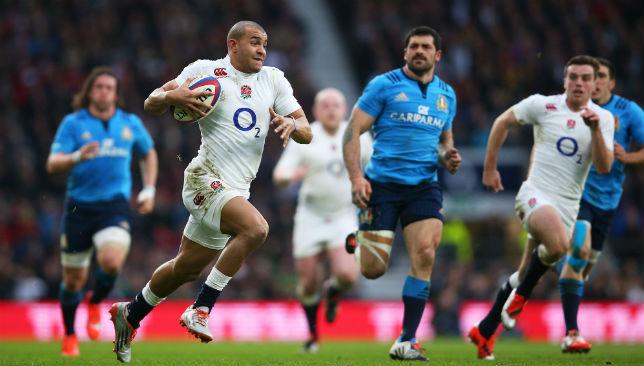
Fans of northern hemisphere rugby union are only just regaining their composure following a barely believable ‘Super Saturday’ that had more twists and turns than a Hollywood thriller. But while they get their breath back, we look at the winners and losers from the last six weeks…
– #360win: Predict #CWC15 finalists and win a 65″ LG Ultra HDTV
– Ireland must talk O’Connell into staying on for one more year
– #360rugby: VOTE now in the UAE Rugby Annual Awards 2015
Playing in what could well be his final Six Nations, O’Connell had a huge influence on Ireland’s championship success. In no game was that more evident than against Scotland at Murrayfield on Saturday as his early try helped the men in green shake off their Cardiff hangover and pile on the points that ultimately handed them the title.
He was run close by Sean O’Brien and Johnny Sexton, whose horror show against Wales aside was exemplary against France, England and the Scots. George Ford and Jonathan Joseph both enhanced their reputations on the international stage, while Sam Warburton and Jonathan Davies excelled for Wales.
Paul O’Connell is not Superman, but he is capable of extraordinary heroics: http://t.co/pnAG8910QK @dk3lly #6Nations pic.twitter.com/WAkEKUdBWn
— Independent Sport (@IndoSport) March 23, 2015
England head coach Stuart Lancaster had his hand forced by injury on the eve of the tournament, but as a consequence he has arguably stumbled upon his best, most potent team. Joseph would not have started had Manu Tuilagi and/or Brad Barritt been fit, however, he came of age over the last six weeks starting with a starring role in a stunning win in Cardiff.
He would end the championship with four tries and his place in Lancaster’s side in little doubt. It has to be said though that he was not the only player in white who enhanced their reputation, as Ford, Ben Youngs and James Haskell all came to the fore.
Had such an incredible six nations. Many memories that I’ll never forget. Thanks for all the amazing support throughout.
— Jonathan Joseph (@Jonathanjoseph0) March 22, 2015
Taking advantage of Tom Wood’s injury, Haskell was another player to benefit from England’s supposed injury crises ahead of the tournament. The Wasps skipper has been in fine form in the Premiership and took that onto the international stage as he formed an imposing back-row alongside Chris Robshaw and Billy Vunipola.
However, while his and his side’s reputation has been enhanced over the last month-and-a-half they were hamstrung by mistakes at the wrong time. England were able to recover from Toby Faletau’s opening try at the Millennium Stadium but Haskell’s sin-binning against France on the final day robbed them of momentum at a key time, and they were unable to overhaul Ireland.
It may sound odd to say that a team that has finished the championship second for a fourth season in succession has progressed, but it is true of Lancaster’s men. As has been stated the coach’s hands were tied somewhat due to injuries but England have discovered a new dimension to their play of late.
Having Ford directing proceedings from No10 and players capable of breaking the gain line outside of him has made England more dynamic. The power in their forward pack has never been questioned but they now have a set of backs to compliment them.
Heading into the tournament, many pundits predicted a five-way fight for the title with Scotland being prominent in that. However, after playing well in defeat to both France and Wales, the Scots imploded against Italy and were woeful in the face of a very good second-half performance from Ireland on Saturday.
Vern Cotter is undoubtedly moving the team in the right direction, but he has a lot of work to do if they are to challenge the world’s best on a consistent basis.
Hv always supported relegation from 6N, or at least a play-off system, and sat’s non performances from Scotland and Italy strengthens that .
— Brendan gallagher (@gallagherbren) March 23, 2015
It’s hard to look past the New Zealander, who has led Ireland to back-to-back championships for the first time in more than 60 years. Yes, he was came out second best against Wales but that game aside – in which Sexton’s lack of fitness proved costly – Ireland were deserved champions.
Steve Hansen might not be a fan of northern hemisphere rugby but this was a tournament full of unbelievable tries, with 27 scored on the final day alone. There were plenty of good ones too, take a bow Stuart Hogg for his score against Wales, Italy’s Luca Morisi against England, Joseph in the same game and Sam Warburton in Rome on Saturday.
But Biggar’s beats them all largely due to a wonderful slight of hand from Dan Lydiate, and the fact it was scored in Paris against France. The pace the fly-half showed to outstrip the home defence also highlighted that he is more than just a tactical brain and booming boot.
The Millennium Stadium is the most atmospheric national stadium, in any sport, in Europe and there are few better experiences than being there when it rises to its feet as one. Wales’ defeat of Ireland elicited one such moment as a blast from Wayne Barnes’ whistle ended more than eight minutes of Irish pressure and gave the hosts the belief it would be their day.
The final day might have provided unparalleled drama and excitement, but for pure emotion the game of the championship came seven days earlier in Cardiff. Warren Gatland, derided by many in Ireland, won the tactical battle with Joe Schmidt as Wales beat their visitors at their own game.
‘Super Saturday’ might not have produced the best try or game, but it did provide the biggest hit as Courtney Lawes took out Jules Plisson at Twickenham. Rallying cries don’t come much bigger than this…